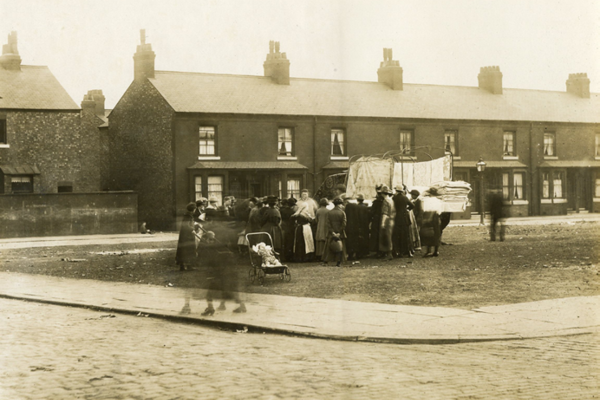
This story is one of the runners-up stories in the 20sStreets competition. The competition invited entrants to research and share stories of the 1920s, searching for the most fascinating local history stories covered by the 1921 Census of England and Wales. There were six winning stories and twelve runners-up entries.
The Battle for Salford’s unofficial markets: the plight of former soldiers
By Steven Illingworth, runner-up (one of ten) in the Individual category
The 1920s were a time of readjustment after the calamity of World War One, when society and the economy tried to come to terms with the enormous loss and disruption caused by this conflict. In 1918, British Prime Minister David Lloyd George had promised returning soldiers that a ‘fit country for heroes’ would be created for them. By the early years of the 1920s, it was clear that a world economic recession and the chaos caused by the war were making this promise very difficult to implement. In the late summer of 1922, a group of veterans from World War One turned up at the council offices in Salford to complain that the actions of the council were damaging their livelihoods and that, given their war service, they deserved better. Their story is one that portrays the hardships and disillusionment of many British people in the 1920s but it is also a story of the triumph of dignity and respect.

A photograph of an unofficial market in Salford
These ex-soldiers had set up unofficial markets on the street corners of working class districts of Salford. Before World War One, most of them had been the owners or holders of small shops. They had closed these shops or sold them to sign up for military service and then, for various reasons, had been unable to resume their business. Two photographs of the unofficial markets set up by these ex-soldiers are in the Salford City Archives. Both pictures show a market stall set up on open ground by a row of terraced houses. Gathered round the stalls are about 30 to 40 people, mainly women but with some men. They look like they are listening intently to the sales pitch of the stallholder. Piled high on the stalls is textile material, possibly to be used as sheets, curtains or made into clothes.
The fact that the returning soldiers set up their unofficial market stalls in residential areas was not welcomed by everyone who lived in the neighbourhood, as documents in the Salford City Archive and Local History Library show. In January 1922, Mary Smith wrote to Salford Council to complain about a market set up near her house on Lord Street, Lower Broughton, a working class district of Salford. She said she wanted ‘to express my intense annoyance’ about a market, where ‘the stalls are fixed up close to my windows and the noise of buying and selling is distracting. It is not right that peaceable tenants should have to endure it’.
The council did take action to close the unofficial markets, partly through the concerns of local residents like Mary Smith but also to protect the livelihoods of the official market traders in Salford, who were concerned about the competition from these new traders in the local area. In May 1922, the council started to act against an unofficial market on the corner of Lord Street and Clarence Street in Lower Broughton, almost certainly the market that had been troubling Mary Smith. The Town Clerk of Salford sent a letter to Mr Joseph Herman of Strangeways, a short distance from the Lower Broughton part of Salford where the market was located. The letter said that Herman was known to ‘attend and sell various articles’ at this market. The Town Clerk made it clear that the unofficial market on the corner of Lord Street and Clarence Street was ‘an infringement of their (the council’s) rights’ and threatened Herman with ‘legal proceedings’.
Another document in the council’s archive mentions that Herman refused to accept the letter when it was delivered to him by registered post. From this action it can be presumed that Joseph Herman’s reaction to the council’s instruction was one of both anger and defiance. He must have thought that it was unfair enough that he had lost his original livelihood through serving in the war, but then it was doubly unfair that his spirit of enterprise in setting himself up with another business was not going to be allowed. Instead of being treated as a war hero, he was being spoken to as if he were a criminal.
Three months later, in August 1922, the issue of the unofficial markets in Salford came to a head. On 29 August a letter was sent to the chairman of the Salford Town Hall and Markets Committee. It announced that ‘a deputation of discharged soldiers’ would attend the meeting of this council sub-committee two days later ‘to voice their grievances and hardships caused by the closing down of the market on which we each and every one made a day’s wages, together with our insistence that we be permitted to carry on, and earn our livelihood’.
The letter writer did not give their name and simply signed it as ‘Ex-soldier, Resident and Ratepayer’. This anonymity and also the suggestion that a large number of disgruntled men would descend on the council offices two days later may have seemed quite threatening to the council officials receiving the letter. This was 1922, just five years after the Russian Revolution when the Communists had seized power on behalf of the working classes, overthrowing the authorities with violence. There had been workers’ risings in Germany and other European countries since the war, while militant trade unionism was growing in Britain and would lead to the General Strike in 1926.
However, the tone of the protest owed more to traditional British politeness than it did to workers’ revolutionary action. The final sentence of the letter from the unofficial market stallholders was very considerate and conciliatory, saying that ‘we hope that you will grant us this opportunity of voicing our views personally and will not detain you any longer than you desire’. Likewise, when the delegation appeared at the town hall two days later they made it clear that they would abide by any decision made by the council after the views of the market stallholders had been heard. Despite the strong feelings aroused by the closing of the unofficial markets and the fact that livelihoods were threatened, this was a very dignified and respectful protest.

A letter from an ex-soldier to Salford Council in support of the unofficial markets
On 31 August 1922, two days after the letter was sent by the ‘Ex-soldier, Resident and Ratepayer’, a delegation of stallholders from the unofficial Salford markets turned up at the town hall. Six of them were allowed to attend the council meeting, where they made it clear to the committee that they had all served in the armed forces for nearly the whole duration of World War One. It transpired that the anonymous letter writer was a Mr Bernard Waywell of Beswick in Manchester, about three and a half miles from the unofficial market in Lower Broughton, Salford. Waywell told the council committee that 55 ex-soldiers would be affected adversely by the forced closure of the unofficial market at Lower Broughton.
One of these and a delegate at the meeting was Albert Tomlinson, who explained a few more details about himself to the committee. He had the letters ‘MM’ after his name in the minutes of the council meeting, meaning that he had been awarded the Military Medal. He also added an explanation of why he had come to the town hall to state his case. The minutes state that he was ‘unable to get a shop; started markets to get a living; three shops in Oldham Road, Manchester, before going into Army’. Tomlinson had clearly lost a lot through his military service, not just one shop but three. His medal showed clearly that he had displayed great courage on behalf of his country and he must have been very frustrated that his apparent reward for this was to lose his substantial livelihood, followed by the extra blow from the authorities when they closed the unofficial markets which had been his back-up way to earn some kind of living.
The effect of this delegation of unofficial market stallholders was generally positive. Up to this point, Salford Council had endeavoured actively to close the unofficial markets but, having met the delegation on 31 August 1922, the councillors adopted a more open-minded approach. It was decided that the continuation of unofficial markets would be decided by each local community, with public meetings being held to determine the level of support or opposition. A week later a large gathering in Lower Broughton proclaimed overwhelming support for the unofficial market there, with many arguing that they provided goods at cheap prices for poorer people. The dignified protest led by Waywell and other stallholders had clearly been a success. To the credit of Salford Council, they had listened to the ex-servicemen’s account of economic hardship and responded sympathetically. The 1920s were certainly a time of great difficulty for many ex-soldiers, but the story of the unofficial markets in Salford demonstrated that the authorities still recognised and respected their contributions and sacrifices during World War One.
The rest of the winning and runners-up stories will be published on our 20sStreets portal in the coming weeks.
